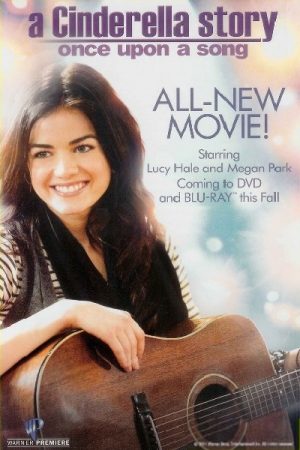
I didn’t think one could do much worse than Another Cinderella Story (2008), the abysmally redundant sequel to A Cinderella Story (2004), but now comes A Cinderella Story: Once Upon a Song, the third entry in the franchise, which claims to reinvent the classic fairy tale but appears more content with recycling its own platitudes. It seems Warner Premiere plans to churn out one of these every four years or so, no doubt hoping to bank on the modernised princess fantasy carefully manufactured by the Disney Channel. However, any mother and father worth their salt ought to see the difference, and, with this movie, it’s imperative that they do.
The studio’s methods prove as cynical as its motives: pick an up-and-coming starlet, shove her in a hastily produced rom-com that equates fame with purpose, and release the piece of consumer propaganda as soon as she gains a tween following. Need I bother with the plot, which has our notional Cinderella, Katie (Lucy Hale), at the mercy of a domestic tyrant bent on launching her tone-deaf daughter’s pop career? It’s the same as in the previous instalment, except with song instead of, uh, song masquerading as dance, making the extended Bollywood number at the halfway mark somewhat jarring, not least because it interrupts a song. Woops.
Oh, well, the story doesn’t matter, you see. A Cinderella Story: Once Upon a Song pertains to star power. Even Mickey (Titus Makin Jr), the token black cast member who goes out of his way to out-black the blackest black stereotypes, says so: “There are two kinds of people in this world. There are wannabes, and there’s gonnabes. You and I are gonnabes, so what do we do? We stay away from the wannabes, all right?” By the way, this isn’t a throwaway line. It’s a distillation of our heroine’s journey. In the end, Katie finds the courage to screw over her wicked stepfamily not because they’re mean so much as because she’s got talent and they don’t. Such a lovely moral to teach your children, wouldn’t you say?
Mind you, as rising stars go, Lucy Hale assuredly fits the bill. The girl has got screen presence, acting chops, a face that indeed belongs on the cover of every magazine (at least for a while), and that certain je ne sais quoi that makes little girls instantly want to relate to someone. This makes her character’s chronic passivity all the more frustrating, as even the lyrics to her songs present the would-be role model as an object to be either used or discarded: “Don’t break my heart before I give it to you […] Don’t say it doesn’t fit before you try it on.” Does the world really need another Bella Swan?

It doesn’t help that we’re never told why Tracy likes her Prince Charming Luke (Freddie Stroma), seeing as the trust fund brat spends most of the film condescending to her and, at one point, even leaves the girl locked out of her own home so he can flirt with a pretty blond. Oh, and she’s got no clothing to boot because, you know, nothing captivates aspiring tween princesses like the thought of an older boy giving them a patronising smile as he ogles their naked body without consent.
One gets the impression screenwriters Erik Patterson and Jessica Scott thought they were penning a raunchy sex comedy, what with all the crass humour, double entendres, and penis references. Seriously, twenty minutes into A Cinderella Story: Once Upon a Song, an Indian guru (Manu Narayan) threatens to poke the stepmother, Gail (Missi Pyle), with his fourth eye. I can’t begin to imagine what the movie’s young demographic makes of that scene or, for that matter, of the inconsistent characters, ropy plotting, and rampant misogyny.
Consider Katie’s stepsister Beverley, played by Megan Park with more depth and maturity than the screenplay ought to allow. How can the minds behind A Cinderella Story: Once Upon a Song expose her crippling self-esteem issues two scenes before the climax and then expect us to celebrate her downfall? Perhaps I’m asking for too much sensitivity of filmmakers who see it fit to portray all the male characters as kind-hearted benefactors and all the women as insecure sociopaths. Even the heroine and her BFF Angela (Jessalyn Wanlim) come off morally ambiguous at best, because, you know, there’s no better movie for your little girl than one telling her she should hate herself.






Recent Comments